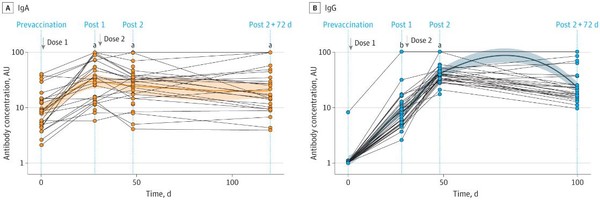Breastfeeding mothers who developed antibodies against Covid-19 after vaccination or infection can protect infants against the virus through their milk, a study showed.
The research team at the Pediatrics Department of the University of Rochester School of Medicine and Dentistry released the results of the cohort study on 47 lactating mothers with a history of Covid-19 infection and 30 lactating mothers who were vaccinated in the Journal of the American Medical Association (JAMA) Pediatrics on Wednesday.

The research team recruited 47 mothers with Covid-19 during breastfeeding between July 2020 and April 2021 and secured milk samples on days 1, 3, 7, 10, 28, and 90.
Also, the researchers enrolled 30 breastfeeding mothers who received the first dose of either Pfizer’s or Moderna’s Covid-19 vaccine between December 2020 and January 2021 and collected milk samples on day 18 after the first dose and day 90 after the second dose.
Then, the research team analyzed immunoglobulin A (IgA) and immunoglobulin G (lgG) antibodies in the obtained breast milk samples.
The results showed that the infection group developed IgA antibodies more quickly and robustly. Moreover, IgA antibody response continued at least for 90 days. In contrast, IgG antibodies were not observed in the early days but increased over time. Also, 73 percent of the infection group had IgA and IgG antibodies gradually increasing for 90 days after infection.
In the vaccination group, IgA rose after the first dose but decreased after the second dose. Thus, their initial IgA levels were lower than those of the infection group.
However, IgG antibodies in the vaccination group were more uniform and stable than those in the infection group.
Sixty percent of the vaccination group demonstrated neutralizing activity after the first dose, and the proportion went up to 85 percent after the second dose.
“Importantly, whether a dominant IgA or IgG response, both infection, and vaccination generated human milk with neutralizing activity,” the research team said. “This supports the likelihood of human milk providing infant protection proceeding lactating parental SARS-CoV-2 infection or immunization.”

